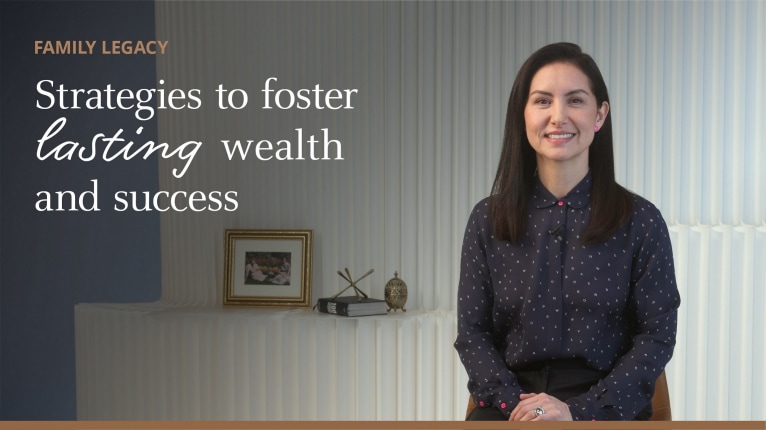Planning Here’s why you still don’t have a will – or haven’t kept the one you do have up to date

Byline: Jeff Kreisler, Head of Behavioral Science for J.P. Morgan Private Bank and Sally Venverloh, Managing Director, Wealth Advisor
Aretha Franklin, the “Queen of Soul,” not only lives on as a Motown legend, but also as a public reminder why everyone – and we do mean everyone, from the moneyed super-famous to part-time kindergarten teachers – should have a will and keep it up to date.
Ms. Franklin, whom Rolling Stone magazine twice named the greatest singer of all time, died on August 16, 2018, leaving an estimated fortune of $80 million, but apparently no signed will. Since Ms. Franklin’s death, her four sons have been fighting over her estate. Finally, in July 2023, a jury in a Detroit probate court decided that a four-page document handwritten by Ms. Franklin in 2014 and found under a couch cushion at her home should serve as her will.
Interested in working with an advisor?
Work 1:1 with our advisors to help build a personalized financial strategy that’s built around you.
Of course, a famous singer’s story makes headlines. But apart from Ms. Franklin’s celebrity, this tale is almost commonplace. At J.P. Morgan, we see a great number of otherwise savvy people who have not done any actual estate planning. Even many of those who have estate plans neglect to revise their estate planning documents as their wealth increases and families change.
Far too often, the lack of an estate plan results in disputes and hard feelings among the surviving heirs. The wealthy are warned again and again about this sad potential outcome. Yet a lot of people put off estate planning, don’t sign key documents or fail to keep their plans current.
Why? The reasons, though complex and personal, fall into clear categories. If any of these resonate with you, it’s time to explore ways to overcome the roadblocks that are preventing you from taking care of your family’s future.
Natural feelings
Many people fail to complete or maintain their estate plans because they:
- Are not thinking about the future: Many of us, particularly those working in C-suites or running private businesses, are so focused on what is happening in our present lives that it is difficult to connect to what might happen after we’re gone. And it’s too easy to keep telling ourselves that we’ll get to our estate plans when it’s more convenient. Or maybe we’re convincing ourselves that our children will be reasonable when the time comes; they can handle it; or there is enough money to go around.
- Lack the time: For almost everyone, it’s easier to attend to the most expedient tasks rather than those that require time, care, thought and lawyers.
- Fear loss of control: Some people feel it is pointless to make an estate plan because, in their absence, their influence will inevitably wane. “I can’t control what happens when I’m gone.” The truth is that a strategic, well-thought-out estate plan that clarifies your intentions can be a powerful source of inspiration, guidance and influence for your heirs.
- Fear mortality: No one likes to contemplate their demise.
- Must make difficult decisions: Putting an estate plan together is likely to force a person to make difficult decisions, large and small. Who’ll run your business after you are gone? Should you leave the same amount to all your children when one earns a substantial salary and another struggles? Who’ll get which piece of family jewelry and art?
Facing facts
Step one in getting past any natural hesitancy you may have in engaging in estate planning is, unfortunately, allowing yourself to face how disastrous your failure to address these matters might be for the people you love.
Downsides could include:
- Family discord: Perhaps the greatest tragedy of passing away without an estate plan is that it often results in disharmony among family members. Arguments over who is the rightful owner of which asset too often escalate into costly litigation that runs a real risk of damaging, even destroying, familial relationships.
- Forced sale of assets to pay estate tax: Failure to plan for an estate tax bill can force a fire sale of illiquid assets, especially business interests. For people who have a net worth in excess of the U.S. estate tax exclusion (currently $13.99 million per person; $27.98 million for a married couple),1 a 40% U.S. estate tax on that excess will generally be due nine months after death.
- Delay in transfer of assets to heirs: When people die without an estate plan, their assets must go through probate, and the estate may be involved in litigation if various “heirs” lay claim to the assets.
- Greater transaction costs: An incomplete or nonexistent estate plan is likely to cost your family. Attorneys’ fees will likely be higher. And if there is litigation, costs could seriously reduce your beneficiaries’ inheritances.
- State intestacy statutes: When someone passes away without a will, state law will dictate what happens to his or her assets. That usually means your assets will go to some combination of the surviving spouse, children and perhaps parents and siblings. This forced distribution scheme may be inconsistent with your wishes.
Getting started
So how do you get over your hesitancy? We have a few tips:
- Know that it is normal to be reluctant about an estate plan. According to a 2021 Gallup poll, less than half – only about 46% – of U.S. adults have a will; this polling result has not varied significantly over the past 30 years.2
- Imagine the future. Allow yourself to envision what would happen to your family, friends and charities if something should happen to you. What do you want your wealth to do for them after you are gone? Be specific. Focus on how happy you will feel knowing you’ve provided for your family’s future in an organized and thoughtful way.
- Prioritize. Advise yourself. We often give better advice to others than we do to ourselves. Perhaps more importantly, we can be kinder to others than we are to ourselves. So imagine your best friend came to you and said, “My advisor thinks I should make an estate plan, but I think I should just deal with my current challenges.” What would you say?
- Take control of the future. Realize that estate planning is a process. An estate plan memorializes your decisions about what you want to happen to your wealth and how you want to provide for your loved ones after you pass. Who will control the wealth? Who will enjoy it? And remember, as long as you are alive and competent, you can change your estate plan at any time.
We can help
It’s easy to get started. Reach out to a trust and estates lawyer and let a J.P. Morgan advisor know you’re thinking about creating an estate plan. They can work together to structure your assets and set up the necessary accounts to help ensure your wealth plans support the hopes and dreams you have for your family’s future.
Invest your way
Not working with us yet? Find a J.P. Morgan Advisor or explore ways to invest online.
Jeff Kreisler
Head of Behavioral Science, J.P. Morgan Private Bank
Head of Behavioral Science, J.P. Morgan Private Bank
Jeff Kreisler is Head of Behavioral Science for J.P. Morgan Private Bank and Founding Editor of PeopleScience, a thought-leadership platform for applied behavioral science. Jeff’s second book – "Dollars And Sense: How We Misthink Mo ...More
Footnotes
-
1
Internal Revenue Service, “Estate Tax.” (October 29, 2024)
-
2
Gallup, "How Many Americans Have a Will?" (June 23, 2021)



